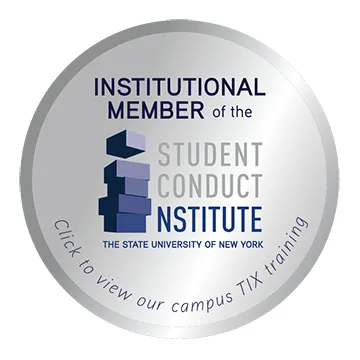Title IX

What is Title IX?
Enacted in 1972, Title IX states that “No person in the United States shall, on the basis of sex, be excluded from participation in, be denied the benefits of, or be subjected to discrimination under any education program or activity receiving Federal financial assistance,” absent certain exceptions. 20 U.S.C. 1681.
Sex-Based Harassment
Sex-Based Harassment is considered discrimination on the basis of sex if it includes harassment due to actual or perceived sex stereotypes, sex characteristics, pregnancy or related conditions, sexual orientation, and/or gender identity.
Alfred State College does not discriminate on the basis of sex and prohibits sex discrimination in any Education Program or Activity that it operates, as required by Title IX and its regulations, including in admission and employment.
The college's regulations concerning sex-based harassment and examples of prohibited conduct can be found in Alfred State's Title IX Grievance Procedure and the Student Code of Conduct. In short, the offenses codified under Title IX and college policy are Sex-Based Harassment, Sexual Assault, Dating Violence, Domestic Violence, and Stalking.
Any person (student, faculty, staff, or guest) who believes they have been discriminated against on the basis of sex are encouraged to contact the college's Title IX Coordinator (contact information below) to discuss their concerns and/or file a complaint. Title IX Intake Form (pdf)
Definition of Consent
Consent or "affirmative consent" means a knowing, voluntary, and mutual decision among all participants to engage in sexual activity. Consent can be given by words or actions, as long as those words or actions create clear permission regarding willingness to engage in the sexual activity. Silence or lack of resistance, in and of itself, does not demonstrate Consent. The definition of Consent does not vary based upon a participant’s sex, sexual orientation, gender identity, or gender expression. Consent to any sexual act or prior consensual sexual activity between or with any Party does not necessarily constitute Consent to any other sexual act. Consent is required regardless of whether the person initiating the act is under the influence of drugs and/or alcohol. Consent may be initially given but withdrawn at any time. Consent cannot be given when a person is incapacitated. Incapacitation occurs when an individual lacks the ability to knowingly choose to participate in sexual activity. Incapacitation may be caused by the lack of consciousness or being asleep, being involuntarily restrained, or if an individual otherwise cannot consent. Depending on the degree of intoxication, someone who is under the influence of alcohol, drugs, or other intoxicants may be incapacitated and therefore unable to Consent. Consent cannot be given when it is the result of any coercion, intimidation, force, or threat of harm. When Consent is withdrawn or can no longer be given, sexual activity must stop.
Policy for Alcohol and/or Drug Use Amnesty in Sexual Violence Cases
The health and safety of every student at Alfred State College is of utmost importance. Alfred State College recognizes that students who have been drinking and/or using drugs (whether such use is voluntary or involuntary) at the time that violence, including but not limited to domestic violence, dating violence, stalking, or sexual assault occurs may be hesitant to report such incidents due to fear of potential consequences for their own conduct. Alfred State College strongly encourages students to report domestic violence, dating violence, stalking, or sexual assault to institution officials. A bystander acting in good faith or a reporting individual acting in good faith that discloses any incident of domestic violence, dating violence, stalking, or sexual assault to Alfred State College’s officials or law enforcement will not be subject to Alfred State College’s code of conduct action for violations of alcohol and/or drug use policies occurring at or near the time of the commission of the domestic violence, dating violence, stalking, or sexual assault.
Grievance Procedure for Addressing Complaints of Sex-Based Harassment
On May 19, 2020, the U.S. Department of Education issued a Final Rule under Title IX of the Education Amendments of 1972 that:
- Defines the meaning of "sexual harassment" (including forms of sex-based violence)
- Addresses how this institution must respond to reports of misconduct falling within that definition of sexual harassment, and
- Mandates a grievance process that this institution must follow to comply with the law in these specific covered cases before issuing a disciplinary sanction against a person accused of sexual harassment.
Based on the Final Rule, Alfred State has implemented an updated Title IX Grievance Policy (pdf), effective Aug. 14, 2020. This policy was revised on Aug. 24, 2021, following notice from the U.S. Department of Education that it would immediately cease enforcement of the Final Rule provision that prohibited decision-makers from relying on statements not subject to cross-examination during a live hearing.
The College's Sexual Misconduct Support & Advocacy Guide details available support services and provides contact information for campus and community resources.
Confidential vs. Non-Confidential Reports
Confidential employees are those whose communications are privileged under federal or state law or who have been designated by the college as confidential for the purpose of providing services to persons related to sex-based harassment. The following officials at Alfred State College may provide confidentiality:
- Practitioners at Alfred State's Health & Wellness centers;
- Persons serving in pastoral roles at St. Brendan and Jude’s Parish
There are other confidential options available for crisis intervention, resources and referrals, but these are not reporting mechanisms to the institution, meaning that disclosure on a call to one of these hotlines does not provide any information to Alfred State College. Please refer to the Title IX Grievance Procedure(pdf) for a complete list of confidential reporting options.
The following officials at Alfred State College will provide privacy, but not confidentiality, upon receiving a report of conduct prohibited by Title IX:
- Title IX Coordinator or designee (contact information below);
- Officials with authority to institute corrective measures under Title IX;
- All other employees at Alfred State that are not designated as confidential resources
Alfred State College requires that any employee who is not a confidential employee must notify the Title IX Coordinator when the employee has information about conduct that reasonably may constitute sex discrimination, including sex-based harassment.
Please refer to the Title IX Grievance Procedure(pdf) for a complete list of reporting options and contact information.
Policy of Nondiscrimination

Alfred State College hereby advises students, parents, employees, and the general public that it offers employment and educational opportunities, including career and technical educational opportunities, without regard to an individual's race, color, national origin, religion, creed, age, disability, sex, gender identity, gender expression, sexual orientation, familial status, marital status, pregnancy, predisposing genetic characteristics, military status, domestic violence victim status, or criminal conviction. Employees, students, applicants, or other members of the college community (including but not limited to vendors, visitors, and guests) may not be subjected to harassment that is prohibited by law or treated adversely or retaliated against based upon a protected characteristic.
Alfred State policy is in accordance with federal and state laws and regulations prohibiting discrimination and harassment. These laws include the Americans with Disabilities Act (ADA), Section 504 of the Rehabilitation Act of 1973, Title VII of the Civil Rights Act of 1964 as Amended by the Equal Employment Opportunity Act
of 1972, and the New York State Human Rights Law.
Alfred State College does not discriminate on the basis of sex and prohibits sex discrimination in any Education Program or Activity that it operates, as required by Title IX of the Education Amendments of 1972 and its regulations, including in admission and employment.
Inquiries about Title IX may be referred to Alfred State College Title IX Coordinator, the U.S. Department of Education’s Office for Civil Rights, or both. Grievance procedures are available to interested persons by contacting either of the compliance officers/coordinators listed below:
| Antoinette Gress | Title IX Coordinator & Director of Community Standards | GressAM@alfredstate.edu | 607-587-4325 |
| Angela Koskoff | Chief Diversity Officer and Policy Specialist | KoskofAM@alfredstate.edu | 607-587-4025 |
Watch the "It's On Us" Video
Watch the "Help a Friend" Video

